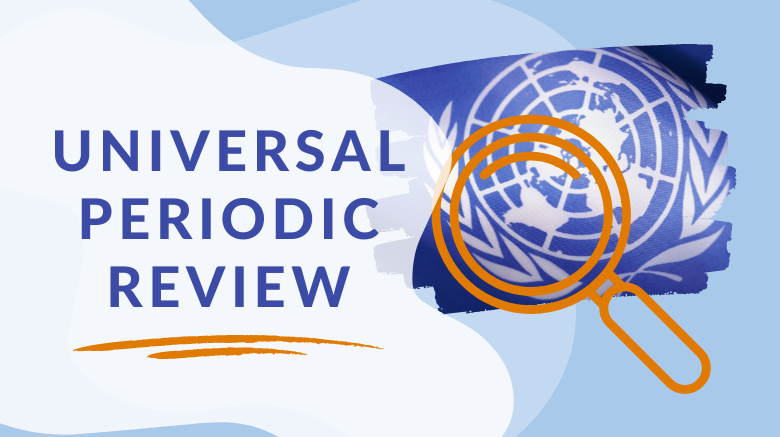Human rights violations transpire in every country. From chronic gun violence to deplorable immigration detention conditions, the 193 United Nations Member States have decided it’s important to hold each other accountable.
Overseen by the United Nations Human Rights Council and organized by the Office of the United Nations High Commissioner for Human Rights, the Universal Periodic Review (UPR) is a process by which peer States review another State’s human rights record and make recommendations for improvement. This impartial review happens regardless of a State’s size, wealth, or military or political importance. The State under review can support or note the recommendations.
The process works on a 4.5-year cycle and reviews 42 countries per year. To date, each of the 193 countries has already gone under two periodic reviews (2008-2011 and 2012-2016), and we are currently in the third cycle (2017-2022).
Three Important Documents
The Universal Periodic Review Working Group congregates in Geneva three times per year to review the documentation submitted by States. Three critical documents are at play when any given country is under review.
National Report: The first report is compiled by the State that is being reviewed. This document contains a self-review of what that State is doing to advance human rights within their borders⸺in addition to follow-up on prior recommendations. This also allows each State to include any barriers to improving human rights in their country. Usually, the government will consult with civil society organizations throughout this process.
Compilation of UN Information: The second document is prepared by the Office of the United Nations High Commissioner for Human Rights (OHCHR). The information is usually a compilation of information by treaty bodies (“committees of independent experts that monitor implementation of the core international human rights treaties”) and other UN agencies.
Stakeholder Summary: The last documentation submitted is typically done collectively by research institutions and civil society organizations, including organizations like Asylum Access. These reports play a critical role in the process because they offer a proximate view of the human rights violations that are taking place. Many civil society organizations submit reports. The UPR Working Group then collects all the information and summarizes it into one document, which is the Stakeholder Summary. The Stakeholder Summary will refer back to the reports from civil society organizations.
Each of these documents is carefully reviewed, and then formal recommendations are established encouraging each State to take specific actions to improve the conditions in their country. Throughout each cycle, States are evaluated on how they have taken action on each of their recommendations.
Asylum Access’ Role in the Universal Periodic Review
The Universal Periodic Review (UPR) is an important advocacy tool that Asylum Access uses in our efforts to make human rights a reality for forcibly displaced people around the world. We engage with the UPR in three main ways:
- Submit human rights reports for review
- Meet with peer governments and suggest recommendations
- Advocate for and support implementation of recommendations
Recently, Asylum Access Thailand and our coalition partners submitted a joint report to the UPR for Thailand’s 3rd review, which is currently underway. We are proposing over 30 recommendations to the Thai Royal Government, including:
- Thailand should ensure that the forthcoming National Screening Mechanism is accessible to anyone who seeks asylum.
- Thailand should end the harmful practice of detaining refugees and asylum seekers and only use it as a last resort. Where release is not feasible, authorities should immediately implement non-custodial and community-based alternatives to detention.
- Thailand should immediately promulgate guidance to all relevant state officials on how to avoid refoulement of anyone who is or may be a refugee or asylum seeker or at risk of being tortured. To ensure adherence to non-refoulement, Thailand should implement national legislation explicitly prohibiting refoulement.
- Thailand should ensure all populations have access to public health insurance.
- Thailand should provide protections to ensure that refugees can hold employers accountable for exploitation, abuse and dangerous working conditions.
- Thailand’s Ministry of Education must actively promote and support all children’s right to education in Thailand.
The report also highlights Thailand’s obligations and responsibilities as a party to multiple international conventions that help protect the human rights of people who have been forcibly displaced.
Conclusion
The Universal Periodic Review is an important human rights mechanism; its peer-review approach encourages global dialogue on human rights, establishes accountability, and promotes the universality, interdependence, indivisibility and interrelatedness of all human rights. Asylum Access engages with this process as one of many tools we use to advocate for the human rights of people who have been forcibly displaced. To find your country, please click here.

